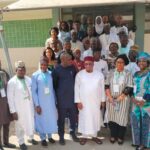By Abigael Joshua
The Nigeria Hydrological Services Agency (NIHSA) on Wednesday in Abuja promised to restore water availability within the Wamako area of Sokoto and its environs.
Mr Clement Nze, Director of NIHSA made the promise at a workshop on improving Integrated Water Resources Management (IWRM) knowledge -based management and governance of the Niger Basin and the Iullemeden-Taoudeni/Tanezrouft Aquifer Systems (NB-ITTAS).
The Iullemeden-Taoudeni/Tanezrouft Aquifer System (ITTAS) is a trans-boundary groundwater resources shared by seven countries of Algeria, Benin, Burkina Faso, Mali, Mauritania, Niger and Nigeria.
Nze was represented by Mr Stephen Jabo, the Director, Department of Hydro Geophysics NIHSA.
He said several intervention measures were going to be taken in the course of the project, to restore water balance in Wamako, so that the water balance and sustainability would be restored to that area.
Nze disclosed that it had been observed that this remote Sokoto river had been drying up and only flowed during the rainy season, which he said was due to the impact of climate change.
“Ideally this has been a river that is perennial in nature over the years. But suddenly, due to impact of climate change and human activity, this has affected the water resources.
“NIHSA is charged with the responsibility of assessment and management of the country’s water resources and has in accordance with its mandate been implementing the project,” he said.
According to him, the project is being implemented by 11 countries, namely Algeria, Benin, Burkina Faso, Chad, Cameroon, Cote d’Ivoire, Guinea, Nigeria, Niger, Mali and Mauritania.
“It is under the central coordination of an agency called Sahara and Sahel Observatory (SOS) based in Tunisia, and the project is majorly funded by Global Environment Facility (GEF) and the project is about both surface and groundwater resources.
“The Niger basin is about surface water, which mainly focuses on the river Niger, which is the largest transboundary River in Nigeria.
“Now, this project has identified a particular water resources problem in the Sokoto river basin,” Nze said.
Dr Thomas Adebayo, Communication Consultant on the project, noted that communication was essential on implementing the project, looking at how they could address issue of water quality.
“Now the water quality is actually hampered by some activities that people do.
“These are problems of drilling of boreholes, some practices by farmers, drainages pattern, indiscriminate waste disposal experienced in Sokoto, Katsina, and its environs.
“The issue of communication comes into place because we need to actually address Nigerians, the communities, stakeholders on processes that affect water quality and areas we should help government ensure that water quality is maintained,” he said.
Adebayo advised that legal frameworks should be put in place to create more opportunities for feedback system.
He added that with this, indiscriminate borehole drilling would be addressed as well as the use of water actually prioritised.
“So, communication cuts across every activity of this project because we need to actually be informed of what the project is all about,’’ the consultant said.(NAN)(www.nannews.ng)
==========
Edited by Abiemwense Moru











